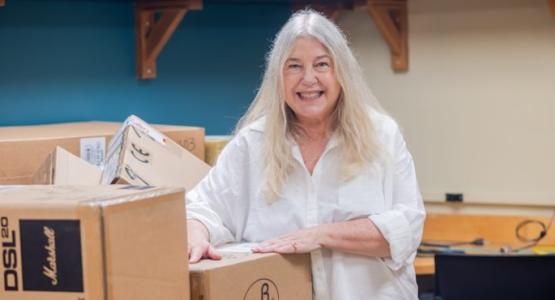
Washington Adventist University Expands Music Therapy Program With Cutting-Edge Technology with Donation from VersaCare
Story by Simonique Dietz, IMC Director
Under the leadership of Dr. Alicia Barksdale, director of Washington Adventist University’s (WAU) Music Therapy program, students will soon gain access to a state-of-the-art recording and technology lab made possible through a grant from the Versacare Foundation.
The grant, which Barksdale and Dr. Daniel Lau the Music Department Chair, applied for in the spring, provides funding for equipment that will transform the program’s capacity to serve patients and train students. The lab will feature two full workstations outfitted with Ableton music production software, three iPad interface stations, and specialized recording technology designed for therapeutic use. According to Barksdale, these tools will allow students to create interventions such as heartbeat recordings for legacy projects with terminally ill patients, music for at-risk infants, and digital beat-making for clients engaged through telehealth platforms.
“This is an exciting step forward,” Barksdale said. “Digital interfacing is becoming increasingly common in special education and healthcare. Our goal is to prepare students with the skills they need to meet clients where they are—whether in person or online.”
Founded in 1990, the Versacare Foundation is an independent, self-funded lay organization that has provided grants to Seventh-day Adventist ministries and select humanitarian efforts for more than three decades. Its board, composed of both lay Adventists and current and former Adventist church employees, is committed to responsible philanthropy that advances educational, healthcare, and service-oriented initiatives.
WAU’s Music Therapy program currently serves 25 students and is pursuing approval for a new hybrid distance-learning track. The model would combine synchronous online instruction with fieldwork at clinical sites where students live, leveraging telehealth and digital music-making tools to deliver therapy remotely. The approach builds on lessons Barksdale learned during the COVID-19 pandemic, when she balanced her adjunct role at WAU with work at Kennedy Krieger Institute and relied on web-based platforms to provide interactive music therapy sessions via Zoom.
The program has rapidly expanded since its launch in 2020, despite the challenges of beginning amid pandemic restrictions. Today, WAU maintains clinical affiliations with more than a dozen regional organizations, including Children’s National Hospital, Saint Elizabeths Hospital, the Maryland School for the Blind, Kennedy Krieger Institute, Gilchrist Hospice, MedStar National Rehabilitation Hospital, and Fairfax County Public Schools. These partnerships provide students with diverse practicum placements in settings ranging from hospitals and schools to senior living communities and hospices.
For Barksdale, the work affirms the transformative power of music. She noted that sound waves and rhythm affect patients physically and neurologically, and she often reminds students that music provides an essential bridge for connection. “God gave us music for a reason,” she said. “It helps us to be better, to heal, to engage—even when words fall short.”
Looking ahead, Barksdale and her colleagues envision expanding WAU’s facilities further, with hopes of eventually housing a dedicated music therapy building. For now, the new technology lab marks a milestone that underscores both the program’s momentum and its mission.
“This grant is more than just equipment—it’s an investment in people’s lives,” Barksdale said. “Our students will graduate prepared to use music to change the world, one client at a time.”
Washington Adventist University invites aspiring music therapists to join this growing program and become part of a movement that is transforming lives through the healing power of music. Alumni, friends, and supporters are also encouraged to invest in the program’s continued expansion. Together with partners like the Versacare Foundation, WAU is building a future where music not only inspires but heals—and where every gift, large or small, helps amplify that mission.

Add new comment